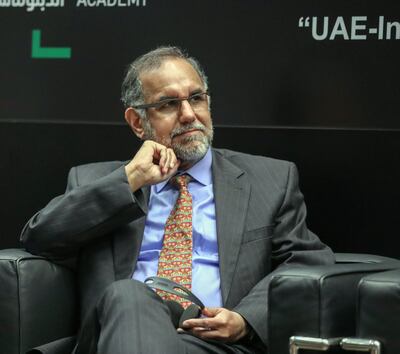People living in the UAE illegally have been warned that the Government’s visa amnesty is their “final chance” to legalise their status.
Diplomatic staff in Abu Dhabi and Dubai urged them to come forward immediately to resolve outstanding residency issues.
Embassy officials said thousands of people were already calling consulates each week with queries over the coming reprieve.
Indonesia said it expected up to 2,500 of its citizens to take advantage of the amnesty, while the Sri Lankan consulate estimated up to 10,000 of its nationals would apply.
Shukoor Ali Kallungal, general secretary of the Kerala Muslim Cultural Centre, a volunteer organisation set up to assist Indian expatriates, said that undocumented workers must take advantage of the amnesty.
“This is the last bus, their final chance,” Mr Kallungal said.
“This amnesty is a great opportunity for people who have been here for a long time without proper papers.
“We’re here to help explain to people how they can get home if they don’t have a passport.
“And for those who don’t want to go back, we’re explaining how they must find another job to legalise their status.”
The three-month amnesty for illegal residents in the UAE starts this Wednesday and ends on October 31.
Under the programme, illegal residents will be permitted to leave the country without facing a fine or a future ban on entry.
Social workers said some workers had overstayed their visas while waiting for wages to be paid after companies who employed them went bankrupt.
_______________
Read more:
Overstay visa families told to settle cases before seeking amnesty
Widows and divorcees tell of legal limbo strain as UAE's new mercy visas unveiled
Special report: Unwed expat mothers in legal limbo hope new visa laws will help them
_______________
Other common cases included undocumented workers who had fallen into debt and managed to clear pending loans but were then unable to pay government fines to leave the country.
“Our main goal is to try to help workers secure a better future by finding them jobs if the role they came out for didn’t work out,” Mr Kallungal said.
“Some men are waiting on salaries so have chosen not to cancel their visas,” he said, referring to employees whose companies may have been forced to fold.
Consular staff from countries including India, the Philippines, Sri Lanka and Indonesia have said they will set up helpdesks at an immigration centre in Al Aweer in Dubai from Wednesday.
Officials would be on hand to advise anyone seeking clarification on their visa status, they said. Navdeep Suri, the Indian Ambassador to the UAE, said: "We want to make sure that nobody is left behind.
“August 1 to October 31 is a defined window and it’s important for us to make sure that Indian nationals who no longer have legal status either go back to India or are able to regularise their status.”
Mr Suri said his embassy was reaching out to numerous community groups within the UAE to ensure all Indians working in the country were aware of the initiative.
He said their message was one of support, and that those in serious financial need could rely on their assistance.

“I’ve met representatives of 30 Indian community associations so we can use their networks to get the word out to those interested that the embassy is their friend,” he said.
“We are here to support them in making sure that they do not contravene local laws.
“We will use the Indian Community Welfare Fund [set up in 2009 to help overseas nationals] to assist those who really have no other recourse.
“We are the fallback if a person is destitute and the community associations also cannot pay.”
Some consulates have already reported receiving up to 80 phone calls, emails and social media messages per day from expatriates inquiring about the amnesty’s details.
Indonesian acting Consul General, Bambang Hutama, said the most common question asked was whether those seeking amnesty would be allowed back into the UAE at a later date.
He said the flight of any Indonesian wishing to return home under the scheme would not be paid for but that all other assistance would be provided.
He also said staff would provide travel documents to anyone wanting to go home but who had lost their passport. UAE officials said illegal workers wanting to apply for a new visa should seek advice from Amer centres in Dubai while those wanting to return home should visit the Al Aweer centre in the city.
Those with pending loans and credit card debt must settle their bank accounts and clear court cases against them before they can take advantage of the amnesty.
“Earlier, people were scared that if they agreed to the amnesty there would be a ban and they could never return to the UAE,” Mr Kallungal said.
“But we have explained that with the amnesty they can come back after two years.
“We tell them they must take advantage of this because it will give them legal documents and an opportunity to restart their lives.”
Under the amnesty’s rules, illegal workers wanting to stay in the country will pay a fee of Dh521 to end an absconding case filed against them and rectify their residency status.
Those wanting to return home are subject to both the Dh521 fee and an additional Dh221 for an exit permit which will allow them to return home.

